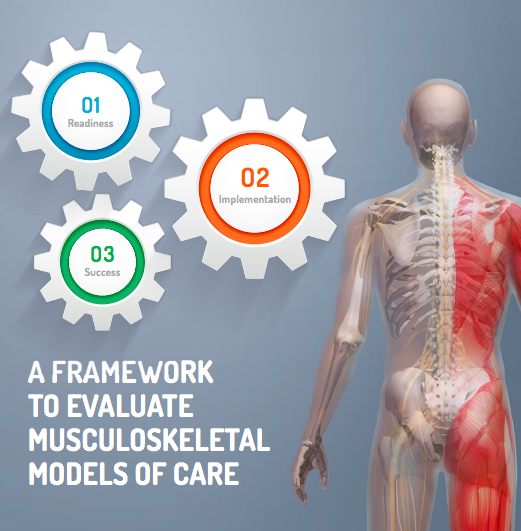Models of Care
Implementing evidence-based prevention and care for individuals with MSK conditions requires planning and action. G-MUSC supports the use of Models of Care as a standardized way to help to evaluate need, complete comprehensive planning and identify the action steps required. Models of care have been developed in different countries and can be leveraged to help countries implement evidence-based programs.
What are Models of Care?
Models of Care are guides, frameworks or policies that outline the principles of care for particular conditions and how to implement care in a local setting. Models of Service Delivery are derived from Models of Care and take a service-level perspective.
Why are models important ?
Models allow for the best coordination of the resources that are available and highlight where additional resources are required.
Evaluating Musculoskeletal Models of Care
A team of Australian researchers, in partnership with the G-MUSC has developed the first internationally-informed framework for developing, implementing and evaluating musculoskeletal Models of Care.
What is the Framework?

The Framework is a document that identifies what needs to be in a Model of Care to make it effective. The Framework sets out actions to guide users in:
- The development process
- The implementation process
- The evaluation process
Who is the Framework for?
The Framework helps people who are planning, implementing or evaluating health services to achieve an optimal Model of Care and ultimately, system reform.
In line with the World Health Organization’s work to develop a guide to assist nations in assessing capacity to respond to the burden of cancer, diabetes, cardiovascular disease and lung diseases, this Framework assists nations meet their musculoskeletal health challenges through Models of Care. The Framework supports the Integrated Care for Older People (ICOPE) approach and Rehabilitation 2030 Agenda.
How was the framework developed?
The project was led by Associate Professor Andrew Briggs (Curtin University, Australia), the Framework was informed by experts from 30 nations, representing high, middle and low-income economies, using a phased research approach. The Framework is now supported by 54 peak international organisations and is used globally to inform Models of Care.
Why is it important?
As more people experience challenges from musculoskeletal conditions Models of Care will become increasingly important as a system-wide response. The Framework will help to support development efforts in Models of Care and offer an approach to standardising evaluation.
Download: Executive Summary here
Download: Full report here
Register your details here to receive updates about the Framework and other resources and learn about our future plans to promote models of care around the world. Read more here.
For more information about Models of Care and how they have been used globally, refer to the special issue of Best Practice and Research Clinical Rheumatology.

